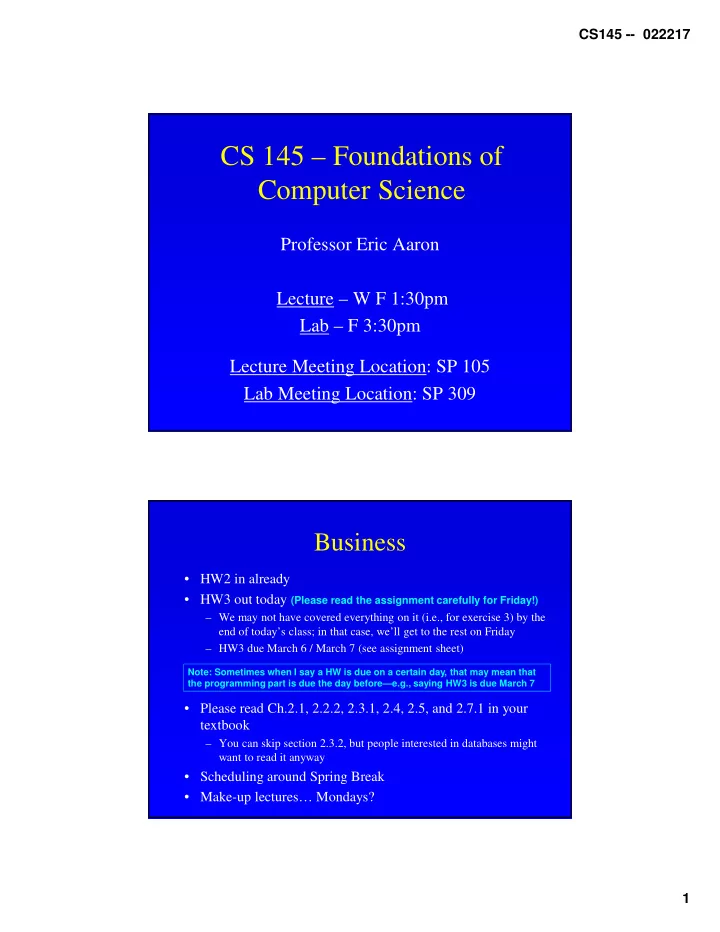

CS145 -- 022217 CS 145 – Foundations of Computer Science Professor Eric Aaron Lecture – W F 1:30pm Lab – F 3:30pm Lecture Meeting Location: SP 105 Lab Meeting Location: SP 309 Business • HW2 in already • HW3 out today (Please read the assignment carefully for Friday!) – We may not have covered everything on it (i.e., for exercise 3) by the end of today’s class; in that case, we’ll get to the rest on Friday – HW3 due March 6 / March 7 (see assignment sheet) Note: Sometimes when I say a HW is due on a certain day, that may mean that the programming part is due the day before—e.g., saying HW3 is due March 7 • Please read Ch.2.1, 2.2.2, 2.3.1, 2.4, 2.5, and 2.7.1 in your textbook – You can skip section 2.3.2, but people interested in databases might want to read it anyway • Scheduling around Spring Break • Make-up lectures… Mondays? 1
CS145 -- 022217 Partitions More formally, a definition of a partition : • Let A be a non-empty set, and let {B i } i ∈ I be an indexed collection of non-empty subsets of A (I is called an index set ) • … Then, {B i } i ∈ I is a partition of A iff 1. {B i } i ∈ I is a pairwise-disjoint collection (do you remember this definition?) 2. {B i } i ∈ I exhausts A (see definition below) – Definition: We say that {B i } exhausts A iff ( ∪ {B i } i ∈ I ) = A • That is, \forall a ∊ A, \exists i ∊ I s.t. a ∊ B i How does this compare to our intuitive sense(s) of what it means for something to be partitioned? Equivalence Relations and Partitions • Equivalence relations and partitions can be viewed as different ways of expressing the same thing: – Every equivalence relation over A determines a partition over A – Every partition over A determines an equivalence relation over A – Thus, in some sense, they’re doing the same thing! • Claim: Every equivalence relation over A determines a partition over A – Proof:? • Claim: Every partition over A determines an equivalence relation over A – Proof:? 2
CS145 -- 022217 Equivalence Relations and Partitions • Claim: Every partition over A determines an equivalence relation over A – Proof: Let {B i } i ∈ I be a partition of A. Thus, each B i is non-empty, and the collection of sets {B i } i ∈ I is pairwise disjoint and exhausts A. – Define relation E = {(a,b) | \exists i s.t. a, b are both in B i } • We say E is the relation over A associated with (or induced by ) the partition {B i } i ∈ I – Claim: E is an equivalence relation over A. Must show E is… 1. Reflexive: (Proof?) 2. Symmetric: (Proof?) 3. Transitive: (Proof?) Equivalence Relations and Partitions • Claim: Every equivalence relation over A determines a partition over A – Proof: Let E be an equivalence relation over A. Consider the sets E a s.t. E a = {x | (a,x) ∊ E}—i.e., the equivalence classes of E – Then, it remains to prove that the collection of all sets {E a } are a partition of A. To fit the definition of partition, we must show 1. Each E a is non-empty 2. The collection {E a } is pairwise-disjoint 3. Together, the E a exhaust A (i.e., every element in A is in at least one E a ) 3
Recommend
More recommend